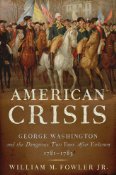
American Crisis By William M. Fowler Jr.
 Most people believe that the victory at Yorktown resolved the question of whether the colonies would become a free and independent nation. In a captivating historical tour de force, William M. Fowler chronicles the two years after Yorktown and informs us otherwise.
Most people believe that the victory at Yorktown resolved the question of whether the colonies would become a free and independent nation. In a captivating historical tour de force, William M. Fowler chronicles the two years after Yorktown and informs us otherwise.
When Lord Cornwallis surrendered on October 19, 1781, the British held Charleston, Savannah, and New York as well as Oswego, Detroit, Michilimackinac and Niagara, and the Royal Navy still dominated the seas. No one, least of all, Congress, knew whether the obdurate King George III would admit defeat, pursue the war, or offer concessions to persuade the colonies to remain part of the British Empire.
Not knowing the enemy’s intention was one problem. Fowler describes an even more serious one: “Congress was nearly bankrupt. The states could not agree on a plan for national revenue, and the fabric of the union, never strong, was fraying as Congress divided into bickering factions.â€
In the early days of the war, divisions had been overcome to build a government and raise an army and navy. Nothing concentrates the mind more than the possibility of being hung. But after 6 years of struggle, all the latent political schisms surfaced. Fatigue and faction overwhelmed cooperation.
If a divided Congress is in bad odor today, it was far worse in 1781. Members often did not even bother to attend, and those who did appointed numerous committees that deliberated endlessly, but never came to conclusions. Some things don’t change.
State authorities, sensing growing popular disgust with Congress, declined to supply the money they had promised, leaving the central government both penniless and powerless. The paper money issued by Congress was virtually worthless and inflation raged. The Articles of Confederation were inadequate for dealing with post war problems or forging an effective national government.
British spies reported American disarray to London indicating that the time was ripe for a renewed military campaign. However, in England the news of the defeat at Yorktown had political repercussions. The government that had pursued the war was tottering. Opposition to pursuing the war was overwhelming. Fowler’s description of British politics and the struggles of British officials responsible for overseeing British troop withdrawals is an intriguing story of its own.
In America, George Washington worried that the victory at Yorktown would weaken colonial resolve and prolong hostilities. Army morale was alarmingly low due to owed pay that Congress was neither able nor willing to tender. Washington feared the army would simply dissolve, leaving the nation defenseless should the remaining British forces attack. His officers, convinced that once peace was declared Congress would not honor its obligations to the army, sent delegations to Congress to plead for settlement but with no result. Washington himself appealed in their behalf and was turned down.
Some in Congress, seeing the urgent need to strengthen the national government, plotted to use the army, already dangerously close to mutiny, to challenge the authority of Congress. A plot to supersede Washington was hatched by the duplicitous General Horatio Gates. However, he was no match for Washington.
With consummate political skill, Washington outwitted Gates and his confederates. In a rare personal appearance, he persuaded the officers to put their country ahead of personal need. Had Washington not acted, a pillar of the American system, civilian control of the military, would have been shattered with who knows what consequences. Fowler writes, “That they did not succeed was due to one man, George Washington.â€
Washington kept control of his dispirited command. He awaited the formal declaration of peace in 1783 and kept his soldiers from deserting. Â Then he presided over a peaceful disbanding of the army despite only promises of future payment from Congress.
Meanwhile loyalists, fearful of rebel retaliation, converged upon New York for British protection. Washington and New York Governor George Clinton negotiated the conditions and timing for departures of the British troops and the loyalists under their protection.
Weary of his years in the field and of political skirmishes, Washington resigned his commission and eagerly returned to his beloved Mt. Vernon. Yet, so convinced was he that a stronger central government was essential for the new nation to endure, he again departed his home and family to preside over the Constitutional Convention.
“For the third time in a dozen years—1775, commander and chief; 1787 president of the Convention—the nation looked to Washington for leadership. In accordance with article 2 of the new constitution, elections were held, electors chosen, and on April 6, 1789, the House and Senate met in joint session as John Langdon, president pro tem of the Senate, declared ‘that he, in their presence, had opened and counted the votes of electors ‘ and ‘whereby it appears, that George Washington Esq. was unanimously elected President.’â€
Washington is justly revered for his military leadership, but his service to the nation 1781-1783, recounted by Fowler, reveals an even more extraordinary man than the one with whom we are so familiar.
Fowler has written a compelling book with a cast of memorable characters all of whom affected the course of American history. However, if any individual was essential to the nation’s survival during the crisis years, it was George Washington. It is Washington’s story that Fowler tells.
 The posts are coming!
The posts are coming!

2 comments
For me, 1781-1783 is a sorta blind period. Thanks for bringing this book to my attention. Sounds like a great book about a period that set up the Constitutional Convention.
[Reply]
Michael E. Newton Reply:
October 19th, 2012 at 5:18 pm
You might also want to read The Perils of Peace by Thomas Fleming.
[Reply]
Leave a Comment